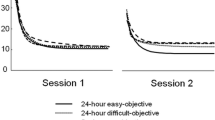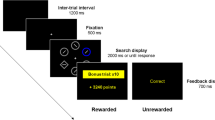Abstract
Two experiments examined the relationship between the desire for effective control over performance outcomes and attributions of causality for those outcomes. In Experiment 1, subjects were led to believe that they had either succeeded at or failed a test that was either unimportant or important. As predicted, failure of the important test was attributed more to lack of effort (a controllable cause) and less to lack of ability (an uncontrollable cause) than was failure of the unimportant test. In Experiment 2, all subjects were led to believe that they had failed a test. Once again, subjects were informed that the test was either important or unimportant. In addition, half the subjects were told that they would be undergoing more tests in a later testing session, while half were not informed of any future testing. As in Experiment 1, subjects failing the important test attributed their failure less to lack of ability than did subjects failing the unimportant test. The anticipation of future testing interacted with test importance in its effects on attributions to ability. Subjects performing the unimportant task attributed their failure more to lack of ability when anticipating future performance than when not. Attributions of subjects performing an important task were not affected by the anticipation of future performance. Results were discussed in terms of the need for control over performance outcomes.
Similar content being viewed by others
References
American Psychological Association Committee on Ethical Standards in Psychological Research.Ethical principles in the conduct of research with human participants. Washington, D.C.: American Psychological Association, 1973.
Dweck, C. S. Role of expectations and attributions in the alleviation of learned helplessness.Journal of Personality and Social Psychology 1975,31 674–685.
Elig, T. W. & Frieze, I. H. A multidimensional scheme for coding and interpreting perceived causality for success and failure events: The coding scheme of perceived causality (SCPC).JSAS: Catalog of Selected Documents in Psychology, 1975,5, MS No. 1069.
Frieze, I. H. Causal attributions and information seeking to explain success and failure.Journal of Research in Personality 1976,10 293–305.
Frieze, I. H., McHugh, M., & Duquin, M.Causal attributions for women and men and sport participation. Paper presented at the meeting of the American Psychological Association, Washington, D.C., 1976.
Hastorf, A., Schneider, D., & Polefka, J.Person perception. Reading, Massachusetts: Addison-Wesley, 1970.
Heider, F.The psychology of interpersonal relations. New York: Wiley, 1958.
Johnston, S., Cunningham, J. D., Passer, M. W., & Kanouse, D. E.Effects of social influence on attributions for success and failure. Paper presented at the meeting of the American Psychological Association, New Orleans, August 1974.
Kelley, H. H. Attribution in social interaction. In E. E. Jones, D. E. Kanouse, H. H. Kelley, R. E. Nisbett, S. Valens, & B. Weiner (Eds.),Attribution: Perceiving the causes of behavior. Morristown, New Jersey: General Learning Press, 1972.
Luginbuhl, J. E. R., Crowe, D. H., & Kahan, J. P. Causal attributions for success and failure.Journal of Personality and Social Psychology 1975,31 86–93.
Miller, D. T. Ego involvement and attributions for success and failure.Journal of Personality and Social Psychology 1976,34 901–906.
Miller, D. T., & Ross, M. Self-serving biases in the attribution of causality: Fact or fiction?Psychological Bulletin 1975,82 213–225.
Mills, J. A procedure for explaining experiments involving deception.Personality and Social Psychology Bulletin 1976,2 3–13.
Nicholls, J. G. Effort is virtuous, but it's better to have ability: Evaluative responses to perceptions of effort and ability.Journal of Research in Personality 1976,10 306–315.
Pancer, S. M. Causal attributions and anticipated future performance.Personality and Social Psychology Bulletin 1978,4 600–603.
Pancer, S. M., & Eiser, J. R. Expectations, aspirations and evaluations as influenced by another's attributions for success and failure.Canadian Journal of Behavioral Science 1977,9 252–264.
Rosenbaum, R. M.A dimensional analysis of the perceived causes of success and failure. Unpublished doctoral dissertation, University of California at Los Angeles, 1972.
Shaver, K. G. Defensive attribution: Effects of severity and relevance on the responsibility assigned for an accident.Journal of Personality and Social Psychology 1970,14 101–113.
Thibaut, J. W., & Kelley, H. H.The social psychology of groups. New York: Wiley, 1959.
Weiner, B. Achievement motivation as conceptualized by an attribution theorist. In B. Weiner (Ed.),Attribution theory and achievement motivation. New York: General Learning Press, 1975.
Weiner, B., Frieze, I., Kukla, A., Reed, L., Rest, S., & Rosenbaum, R. M.Perceiving the causes of success and failure. Morristown, New Jersey: General Learning Press, 1971.
Weiner, B., & Kukla, A. An attributional analysis of achievement motivation.Journal of Personality and Social Psychology 1970,15 1–20.
Wortman, C. B., Costanzo, P. R., & Witt, T. R. Effect of anticipated performance on the attributions of causality to self and others.Journal of Personality and Social Psychology 1973,27 372–381.
Author information
Authors and Affiliations
Additional information
This article is based on a doctoral dissertation submitted to the University of Waterloo, Canada. I would like to express my appreciation to the principal members of my thesis committee, Mark Zanna and John Holmes, and especially to my supervisor, Michael Ross. Thanks are also due to Marvin Brown for his comments on an earlier draft of this article, and to the Canada council for their support while this research was being conducted.
Rights and permissions
About this article
Cite this article
Mark Pancer, S. Control motivation and attributions for performance. Motiv Emot 4, 47–59 (1980). https://doi.org/10.1007/BF00995929
Issue Date:
DOI: https://doi.org/10.1007/BF00995929




